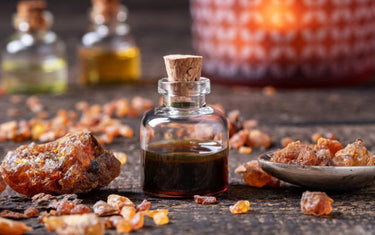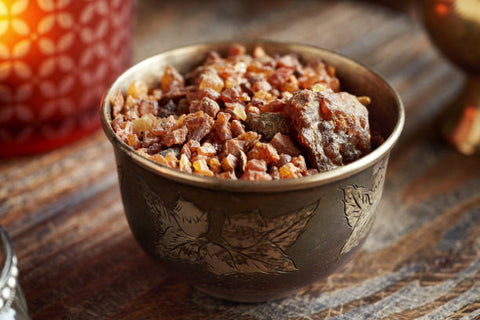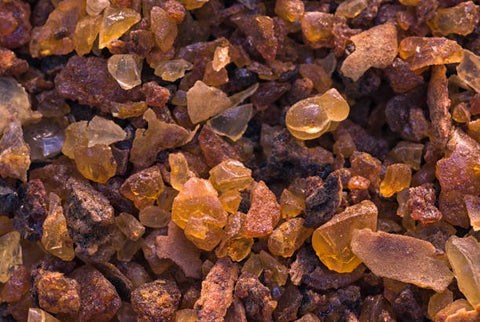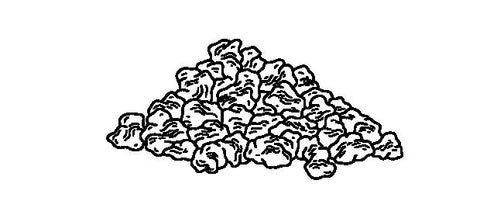9 min read / 12 December 2023 / yasmin sharp
10 Benefits and Uses of Myrrh Oil
Mystical myrrh can help us to manage pain and protects our cells from damage.
Share this post

Myrrh is most famous for its biblical connections, featuring prominently in the life and death of Jesus in the Old Testament.
In fact, there are 152 mentions of myrrh in the Bible, and it has retained a near unbreakable link with religious and spiritual beliefs for thousands of years.
The deep, earthy tones of myrrh essential oil continue to resonate with people all around the world, especially as more has been learned about its potential health benefits.
Whether it's soothing and calming the mind or providing medicinal benefits for the body, myrrh oil remains as popular as ever, and here we take a closer look at its past, present and potential uses for the future.
What is myrrh oil?Myrrh essential oil is extracted via steam distillation from the dried red-brown sap of the myrrh tree, also known as Commiphora myrrha, which is native to southwest Asia and northeastern Asia. On occasion it is treated with a solvent known as benzyl benzoate, to make it more accessible for use in aromatherapy. The difference can be seen in the name of the oil being sold. For example, Myrrh (Thick) is an oil that has been treated, whilst Myrrh (Thin) has not. When using the thinker variant of the oil, it is recommended to heat the oil before use to turn it into a free-flowing liquid. |
How does myrrh oil work?
Myrrh oil benefits the body and mind in different ways and is used as a massage oil, aromatherapeutic treatment, topical solution and much more.
When applied topically, it can provide pain management and anti-inflammatory and antifungal properties that can combat certain types of fungus and bacteria.
In aromatherapy, people diffuse myrrh oil to offer relief from colds, coughs and congestion build up.
It can also have a positive effect on low mood, helping some to lift their spirits and feel more centred and grounded.
Medicinal use of myrrh essential oil sees it applied to heal wounds and abrasions, ease inflammation and to counteract freer radicals by providing a welcome dose of antioxidants.

What are the benefits of myrrh oil?
If you want to explore the benefits of myrrh oil, you could use it to:
1. Offer antioxidant properties
Antioxidants can provide protection for your body against free radicals – unstable atoms that can cause oxidative damage.
When oxidative stress levels become too high it can pose a serious threat to your health, and has been linked to conditions such heart disease, cancer and neuro-degenerative disorders.
Myrrh essential oil potentially contains antioxidants that can work as a preventative measure.
Researchers found that the antioxidant properties of myrrh helped to protect rabbits against liver damage, which could also extend to humans, although more research is needed. [1]
The results of a test-tube study published in 2005 stated that compared to vitamin E – a common treatment against free radicals - myrrh oil was a more powerful antioxidant agent. [2]
2. Prevent antibacterial and antifungal infections
In addition to its antioxidant properties, myrrh oil benefits also enable it to offer protection against bacterial and fungal infections.
This partly explains why the oil was commonly used in Ancient Egyptian societies, along with several other essential oils, to embalm mummies and prevent decay.
It is believed that myrrh oil can offer protection against fungus on the skin. It can also help to combat pure candida – a yeast infection that can form almost anywhere on the body.
A study in 2012 found that the antibacterial benefits of myrrh oil were increased when combined with frankincense. [13]
Results showed that when used together, airborne bacteria counts were reduced by 68%.
3. Improve skin health
Myrrh oil can also be used to improve skin health, extending wellness applications of skincare, whilst also working as an effective remedy against a variety of ailments.
When using myrrh oil on skin, it should always be diluted, even though it is one of the gentler essential oils.
First-time users are advised to complete a patch test before application to ensure it is compatible with their skin.
Many people use the oil to moisturise in the belief that it can help to prevent and reduce the signs of ageing, especially when caused by sun damage.
Scientists have also found that the application of myrrh oil helped to elevate white cell blood counts, which helped to quicken the healing of wounds and irritations. [3]
4. Provide pain management
Compared to the pain-relief abilities of many essential oils, the natural properties provided by myrrh oil are somewhat unique.
This is because, rather than working to actively dull or reduce the source of pain, myrrh oil interacts with opioid receptors in the brain, effectively convincing it that there is no pain to respond to. [4]
Discomfort caused by tension and inflammation can also be eased by myrrh essential oil.
A 2017 study found that participants suffering from tension headaches saw pain levels reduce by around two-thirds after using the oil. [5]
There have even been suggestions that myrrh has the capacity to prevent pain and swelling altogether by blocking the production of inflammatory chemicals in the body.
5. Support oral health
The antimicrobial benefits of myrrh oil can be seen in a host of natural mouthwashes and toothpastes that use it as an ingredient.
Researchers have also conducted test-tube studies that suggest mouthwash containing myrrh could also help to ease gingivitis symptoms, by reducing inflammation around the gums. [6]
When using myrrh oral-care products you must take care not to swallow, as ingesting high quantities of myrrh can be toxic.
It is also advisable to avoid using myrrh mouthwash whilst healing from oral surgery.
Researchers found that stitches – especially those made from silk – could degrade when they come into contact with myrrh. [7]

6. Eliminate some parasites
Parasites can infect the body after contact with pets, contaminated food or water or through sexual activity.
Researchers found that an oral drug made from myrrh sap and its essential oil was able to effectively treat trichomoniasis, a common sexually transmitted parasite. [8]
Once the preliminary study was finished, around 85% of participants had been cured.
The results of an animal study published in 2011 also stated that the same oral drug was able to treat giardiasis, a parasitic intestinal infection. [9]
7. Inhibit cancer growth
More research is needed before any solid conclusions can be reached, but initial testing into myrrh’s anti-cancer abilities has produced some promising results.
Researchers involved in the tests found that the replication or proliferation of human cancer cells could be reduced through the use of myrrh. [10]
The growth of eight types of cancer cells were inhibited by myrrh, specifically gynaecological cancers.
However, it is important to note that this was strictly a laboratory test and has not yet been tested in people with cancer.
8. Aid liver health
According to a study published by researchers from the Beni-Suef University in Egypt, myrrh could have the capacity to detoxify the liver. [11]
This is something that the liver is not naturally able to do, which can lead to the build up of harmful substances in the bloodstream.
For example, if ammonia is not eliminated by the kidneys after being converted to urea in the liver it can be toxic to nerves and affect brain function.
Excessive ammonia can lead to the overproduction of free radicals, leading to dangerous cell damage.
Researchers at the university found that the production of several detoxifying and antioxidant proteins in the liver were induced by myrrh, offering relief in the kidneys, liver and cerebrum.
9. Act as a decongestant
One of the most common uses of myrrh oil is as an anti-cold agent, due to the oil’s powerful decongestant properties.
In aromatherapy, many people diffuse or inhale the oil to offer relief for coughs, congestion, phlegm and even bronchitis.
Other ways to try the benefits of myrrh essential oil is to add a few drops of the oil to a candle or warm bath water.
People with coughs and colds that are affecting the airways also inhale the properties by adding a few drops to a boil of hot water, before covering their head with a towel over the bowl to take in deep breaths that can offer some relief.
10. Improve gut health
When used in combination with chamomile flower extract and coffee charcoal, researchers found that myrrh can work as a safe and effective treatment for diarrhoea. [12]
The study involved 1,062 patients aged 12 and above with a variety of conditions, such as inflammatory bowel diseases (IBD), and irritable bowel syndrome (IBS).
After taking a herbal preparation for a fixed period, researchers saw that there was a significant change in symptoms in those with IBS.
In their conclusion, they also stated that the effects were comparable to conventional therapies used in routine care.

How do I use myrrh oil?
Myrrh oil uses are wide and varied, with many people applying it:
As an aromatherapy oil
The earthy aroma of myrrh oil is not for everyone, although its distinctly powerful based scent does blend particularly well with frankincense.
Diffusing myrrh also offers a way to remove airborne bacteria, whilst also providing a sense of calm and relaxation.
To try it for yourself, add a few drops to a diffuser or oil burner or perhaps dilute and sprinkle into warm bath water.
As a skincare agent
To enjoy antifungal and antibacterial myrrh oil benefits, you could use it as a massage oil.
Topical application can help to treat infections, small wounds and abrasions, whilst keeping the skin looking and feeling young and energised.
Mix with a carrier oil of choice and use daily or spot treat in certain areas as and when needed.
What is the history of myrrh oil?
Like frankincense, myrrh is one of the oldest essential oils in the world, with recorded use dating back as far as 4000 years.
And, of course, myrrh oil has a close association with the Bible, where it is said the oil was presented as a birth gift for Jesus and used in combination with other spices in preparation for his burial.
Whilst it has long been held in high regard in certain religious practices and that remains the case in some quarters today, use of the oil has evolved over time.
Ancient Egyptian societies also utilised the benefits of myrrh oil as a skincare agent.
Women would place the slightly cool substance onto their faces to prevent ageing and to offer relief from sunlight.
Although there has always been an elusive quality to myrrh, ongoing scientific research continues to unravel its mystery to unearth a wealth of possible health benefits.

Myrrh oil FAQs
What are the risks of using myrrh oil?
People with known heart conditions should be careful when using myrrh oil, especially when using it as a mouthwash.
Ingesting large amounts can be toxic and can increase heart rate.
Myrrh has also been linked with miscarriages, so should be avoided by pregnant people.
The oil may also interfere with blood thinners, so speak with a doctor if you are on this type of medication.
Is myrrh essential oil good for hair?
Myrrh oil’s skin health benefits mean it may be able to provide support for hair loss.
Its astringent qualities help to strengthen roots and may be able to reduce hair fall.
Some believe it can also help dandruff due to its moisturising abilities.
However, evidence about myrrh’s hair boosting abilities remain inconclusive.
What does myrrh essential oil smell like?
Myrrh essential oil has a woody, earthy smell that makes it perfect for use as a base scent.
The word ‘myrrh’ comes from the Arabic word ‘murr’ which means bitter.
The oil tends to blend with other essential oils such as frankincense, clove, patchouli, lavender and sandalwood.
[1] Khaled M Ashry et al. (2010) Oxidative stress and immunotoxic effects of lead and their amelioration with myrrh (Commiphora molmol) emulsion https://pubmed.ncbi.nlm.nih.gov/19818824/
[2] P Racine et al. (2005) Quenching of singlet molecular oxygen by Commiphora myrrha extracts and menthofuran https://pubmed.ncbi.nlm.nih.gov/15890469/
[3] Al-Said A Haffor (2010) Effect of myrrh (Commiphora molmol) on leukocyte levels before and during healing from gastric ulcer or skin injury https://pubmed.ncbi.nlm.nih.gov/19995243/
[4] Ream Al-Hasani et al. (2011) Molecular mechanisms of opioid receptor-dependent signaling and behavior https://pubmed.ncbi.nlm.nih.gov/22020140/
[5] Antonio Germano et al. (2017) A Pilot Study on Bioactive Constituents and Analgesic Effects of MyrLiq®, a Commiphora myrrha Extract with a High Furanodiene Content https://pubmed.ncbi.nlm.nih.gov/28626756/
[6] D A Tipton et al. (2003) In vitro cytotoxic and anti-inflammatory effects of myrrh oil on human gingival fibroblasts and epithelial cells https://pubmed.ncbi.nlm.nih.gov/12781209/
[7] Mohammed A Alshehri et al. (2015) Effects of myrrh on the strength of suture materials: an in vitro study https://pubmed.ncbi.nlm.nih.gov/25736257/
[8] G M El-Sherbiny et al. (2011) The Effect of Commiphora molmol (Myrrh) in Treatment of Trichomoniasis vaginalis infection https://pubmed.ncbi.nlm.nih.gov/22737515/
[9] Fouad M Fathy (2011) Effect of mirazid (Commiphora molmol) on experimental giardiasis https://pubmed.ncbi.nlm.nih.gov/21634251/
[10] Shulan Su et al. (2011) Cytotoxicity activity of extracts and compounds from Commiphora myrrha resin against human gynecologic cancer cells https://www.researchgate.net/publication/268292966_Cytotoxicity_activity_of_extracts_and_compounds_from_Commiphora_myrrha_resin_against_human_gynecologic_cancer_cells
[11] Mahmoud, A. M. et al. (2017) Oxidative Medicine and Cellular Longevity 2017, 7369671 https://www.nature.com/articles/d42473-018-00357-w
[12] Uwe Albrecht et al. Efficacy and safety of a herbal medicinal product containing myrrh, chamomile and coffee charcoal for the treatment of gastrointestinal disorders: a non-interventional study https://www.ncbi.nlm.nih.gov/pmc/articles/PMC4533328/
[13] S de Rapper et al. (2012) The additive and synergistic antimicrobial effects of select frankincense and myrrh oils--a combination from the pharaonic pharmacopoeia https://pubmed.ncbi.nlm.nih.gov/22288378/









